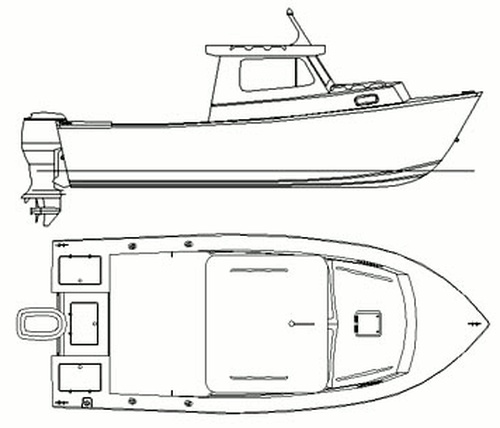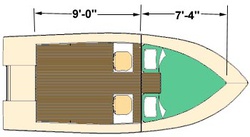Pilot 21 by Bateau.com
[P21] A larger version of P19, the vee hull version of HM19
| Length overall | ||
|---|---|---|
| Beam | ||
| Berths | 2 | |
| Weight | ||
| Engine power | 90 - 150 | |
| Hull construction | Stich-n-glue | |
| See also | Harbor Master 19, Pilot 19, Open Pilot 21, Classic 21 | |
| compare | ||
URL: http://www.bateau.com/proddetail.php?prod=P21
Description:
The Pilot 21 (P21) is a larger version of our P19, the vee hull version of our HM19. The proven hull shape with a typical moderate vee similar to the C21. 45 degrees at the cutwater, 10 degrees at the transom. Sufficient deadrise to run smoothly in bad weather but moderate enough to provide good stability at slow speed without the wild roll typical of deeper vee hulls.
The hull shape is related to our C21 but not identical: see the bow and sheerline for example. The topsides are built with one wide panel instead of two overlapping ones.
The generous freeboard and the classic sheer are tried and true features contributing to seaworthiness. This boat will negotiate both head and following seas with ease. Lightly loaded, the P21 will require 90 HP to cruise in the low 30 mph range. 125 HP is recommended for a well equipped boat at full load.
This boats transom is designed for a standard 25" shaft. The transom can easily be modified to accept other shaft lengths.
The self bailing cockpit depth minimum 26" with 12" wide gunwales, is another important element of safety. Her PPI is at DWL is 543 lbs (247 kg). Thanks to the freeboard and transom design, she can be rated to a max. capacity of eight persons (USCG) and we recommend engines in the 90 to 150 HP range. While stronger than the typical production fiberglass boat of that size, she is also lighter and does not require as much HP (or fuel) to cruise at the same speed.
Layout
The pilothouse has 6' headroom in the middle and there is ample sitting headroom in the cabin.
From stern to bow
Large lockers on each side of the motorwell can be used for storage or bait well. The self-bailing cockpit sole is high enough to stay above the waterline until the displacement reaches 3,500 lbs.
Under the cockpit floor, we show 60 gallons fixed fuel tanks.
Under the nicely cambered pilothouse roof, the rear frame of the pilothouse doubles as a grabrail.
The skipper will find enough room in front of the wheel to mount electronics and we use the extension of the cabin roof as a dashboard. The same surface on the port side can be a small chart table.
Access to the cabin is through an open companionway but feel free to install a sliding hatch.
The vee berth is 7'-4" long and a Porta-Potti slides under the mid section. On deck, the 8" wide gunwales extend all along the pilothouse and cabin side. Handrails on each roof helps circulation forward.
Options
There is room for a bench in the rear if one needs more seating.
Under the gunwales, the frames can be cut to act as rod holders. There is ample storage room in the seat boxes: they extend all the way to the hull sides. With the proper foam insulation, a seatbox can be used as an ice box.
The pilothouse can be partially or completed closed with Plexiglas or Lexan but builders should keep the size of the boat in mind and not make the topsides too heavy or excessively increase windage. Framed or hinged windows are possible but keep them light.
We show a small hatch and portholes in the roof and cabin sides for light and ventilation.
The P21 can be made unsinkable with expandable buoyancy foam under the sole while foam sheets glued under the gunwales will guarantee upright floatation.
This boat can be built with a closed transom for bracket installation.
See also
Boats about same size as Pilot 21

|
Open Pilot 21
[OP21] The Open Pilot 21 is a larger, open cockpit version of P19
|
|
Redwing 21
Power launch
|
|
Redwing 21 Pilothouse
Pilothouse power cruiser
|
Questions? Suggestions? Contact us at: info@boatplans.cc

